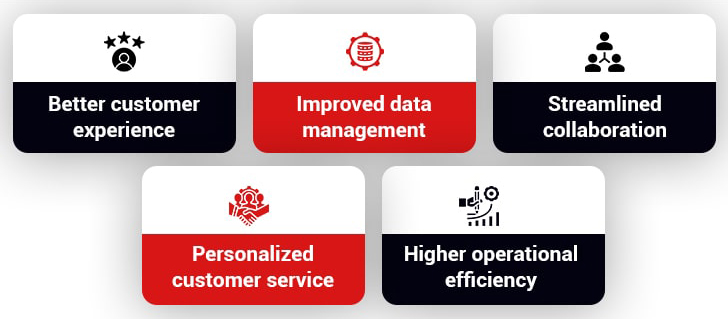Differentiation in the insurance industry is largely driven by understanding customer requirements and earning their loyalty. To gain an edge in this highly competitive environment, insurers use insurance CRM software for gauging needs, enhancing the customer experience, and streamlining the complete insurance cycle.
Accordingly, insurance CRM systems are an excellent addition to the tech stack for insurance companies aiming to accelerate growth. In this post, we will explore the value insurance CRM brings to the table and how insurers can use it to enhance their core offerings.
The Importance of CRM in the Insurance Industry
Most future-focused insurance businesses opt for insurance CRM solutions to deliver a superior and differentiated experience while engaging with customers at their preferred channel. Moreover, it enables them to manage and keep a real-time tab on the interactions during the customer’s journey with the business.
An advanced CRM system structures the sales process by organizing customer interactions chronologically. This helps insurers gather relevant insights at every touchpoint. Effective communication between insurers and prospects improves conversion rates. Another merit of insurance CRM software is that it centralizes insurance data for analytics and facilitates better decision-making throughout the insurance processes.
How CRM Benefits Insurance Businesses
Key Drivers for CRM Adoption in the Insurance Industry
There are two key drivers for the adoption of CRM software in the insurance industry.
1. Need for Personalization
Insurers strive to personalize customer experiences and meet their needs while ensuring long-term customer loyalty. Though it is easier said than done! But insurance CRM wins the game here. These solutions help insurers personalize customer experiences by providing a comprehensive 360-degree view of each customer and omnichannel communication. By harnessing extensive customer interaction data, insurers can create highly tailored and effective sales pitches.
CRM software helps insurers leverage data points such as communication channel preferences, social networks, and location attributes to integrate them with information characteristics like products and contact numbers to improve customer understanding.
2. Need for Automation
Future-looking insurers need highly-efficient automated solutions for lead generation and conversion. Insurers implementing robotic process automation (RPA) report transformative benefits, including a 65% reduction in customer service costs and automation of 92% of routine customer interactions. However, achieving this goal is impossible if insurers continue to rely on capturing and managing data in an offline environment.
CRM transforms processes into a digital ecosystem, making data collection, maintenance, transfer, and computation seamless. Automation is achieved through the digital transformation of business processes and workflows followed by end-to-end tracking of sales activities and customer interactions.
Transform your CRM Approach Today
9 Key Features of Modern Insurance CRM
1. Mobility
Mobility refers to the ability to access CRM systems via mobile devices. It enables customer-facing employees to retrieve and update databases with relevant information, even while on the go. As organizations increasingly adopt decentralized structures, mobility becomes a critical asset for forward-thinking insurers.
2. Integration
As the heart of any customer-facing organization, CRM cannot function in a vacuum. This is where integration is required. It harmonizes the CRM with other digital tools and technologies. Integration fosters smooth communication and channels relevant information in real-time so that employees’s precious time and efforts aren’t wasted in searching for information.
3. Analytics
Modern-day insurance CRM solutions leverage the power of insurance data analytics tools to provide on-demand insights to front-line staff for making informed decisions. These deep insights empower the sales staff to make strategic decisions based on the stage a prospect is in during their buyer journey.
4. Cloud
Cloud computing capabilities make data easily accessible between agents, experts, and customers, regardless of their geographical location. Apart from centralizing data and forming a single source of truth, cloud technologies also ensure that the data is up-to-date across all terminals in real-time.
5. Collaboration
The insurance industry requires frictionless collaboration between various fragmented entities. Whether it is collating customer information or updating policy details, every action is orchestrated through the coordination of multiple individuals or teams. By standardizing and unifying processes using a collaborative platform, businesses can address various bottlenecks that hamper productivity.
6. AI Capabilities
With 70% of insurers planning to implement AI models that leverage real-time data predictions within the next two years, the role of AI in transforming the industry is undeniable. CRM systems with AI capabilities predict customer behavior, recommend the best-fit policies, and proactively address client concerns. These intelligent systems analyze large datasets in real time to uncover trends, automate repetitive tasks, and offer insights that improve decision-making and customer engagement.
7. Customization Options
Customization options help insurers configure the CRM platforms to suit specific business needs, offering flexible modules for sales, marketing, and claims management. Customization ensures scalability as the business grows. It allows for seamless integration of additional features without disrupting existing workflows.
8. Security and Compliance
While handling sensitive data, modern CRMs offer robust security measures and ensure compliance with industry regulations and protect customer information. Features like encrypted data storage, access control, and audit trails safeguard against breaches. They also ensure adherence to global standards like GDPR and HIPAA.
9. Multichannel Communication
CRM tools support multichannel communication, enabling agents to interact with customers via email, chat, phone, or social media, providing a seamless experience. This ensures consistent messaging and a unified approach to customer service, improving satisfaction and fostering trust across all platforms.
Conclusion
Modern insurance CRM systems have the potential to reinvent the outlook of the insurance industry by reimagining customer experiences. Built on nine key functionalities—analytics, mobility, cloud, collaboration, integration, customization, among others—CRM systems are reshaping how insurers interact with customers. By using intelligent automation and AI to collect and analyze customer behavior, these platforms offer valuable insights that enhance decision-making and foster deeper customer relationships. Ultimately, CRM software empowers insurers to deliver more personalized, efficient services, driving growth and positioning them for success in an increasingly competitive market.







